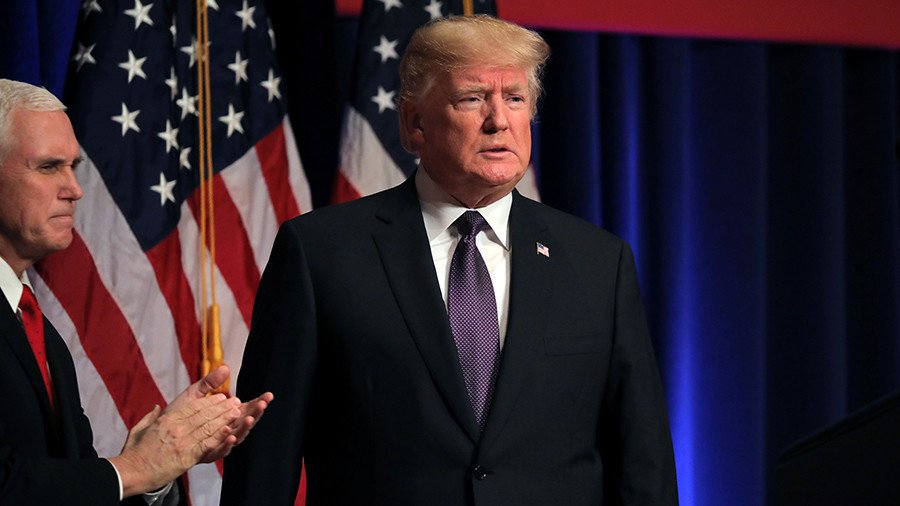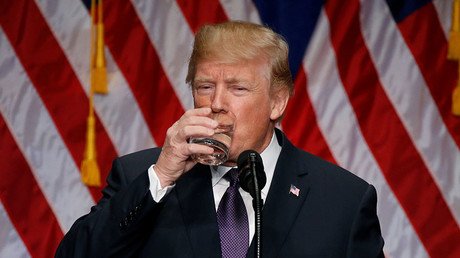Trump’s national security strategy proves US foreign policy never really changes

US President Donald Trump’s newly published National Security Strategy has taken aim at Russia, painting the country as a top adversary that “interferes in the domestic political affairs of countries around the world.”
There is no mention of any policy geared toward mending broken relations between the two powers, something which Trump the candidate had promised to attempt. Instead, the 68-page document reads like something the White House would have produced when Trump’s predecessor Barack Obama occupied the oval office— at least where Russia and other ‘adversaries’ are concerned.
“China and Russia challenge American power, influence, and interests, attempting to erode American security and prosperity,” the document reads.
Two and a half years ago, while American journalists were getting their pants in a twist over the allegedly budding friendship between Trump and Vladimir Putin, I suggested in this column that many were “seizing on a few off-the-cuff comments too soon”. Some with high hopes for Trump’s ability course-correct on Washington’s relationship with Moscow criticized my cynicism and my unwillingness to believe that Trump could be the savior they had been waiting for. I wrote that Trump’s apparent obsession with countering Obama’s “weakness” and determination to make Putin “respect” him could lead to a quick souring of relations.
Here we are, a year into Trump’s presidency and his first national security strategy document refers to Russia on 17 occasions, negatively throughout. Russia is referred to as a repressive regime working to undermine democracy worldwide. Moscow, the document says, uses “subversive tactics” to interfere in the domestic political affairs of foreign nations. The Kremlin has also continued “its failed politics of the Cold War” by supporting its “radical Cuban allies” and the “dictatorship in Venezuela”. There is nothing included about mending fences or working together to solve common challenges.
Whatever the merits or faults of Russian foreign policy, I would merely note that there is a certain irony to the US, with nearly 800 military bases worldwide, feigning disgust at the relatively confined military actions of a power which spends approximately nine times less on its defense — or indeed pretending to hold some deep moral objection to propping up dictatorships, while it remains chummy with Saudi Arabia, one of the most brutal dictatorships in the world.
There are those who are determined to defend Trump’s latest U-turn when it comes to relations with Russia. It usually goes something like this: “Trump really did want good relations with Russia, but he couldn’t follow through because the Deep State got to him!”
There is some merit to that argument. After all, there is a ‘deep state’ — it is true. It is also true that those operating under the radar do not want improved relations with Moscow — and that they would have made it extremely difficult for Trump to even attempt to mend fences with Moscow, if he wanted to.
But it is an error to believe that Trump ever personally adhered to any kind of true philosophy when it came to Russia. From day one, his rhetoric was all over the place when it came to the Ukraine crisis, sanctions and NATO — as I detailed here. If you listened carefully, it was easy to see that Trump changed his mind with the wind. This was clearly due to the fact that he had no genuine understanding of many of the foreign policy issues he was talking about. The chopping and changing thus rendered any ideas he may have had about building good relations with Russia totally irrelevant. Trump’s good intentions, if they existed at all, don’t matter in Moscow. Reality matters — and when Trump ordered an airstrike on Syria’s Shayrat airfield in April this year, just three months into his presidency, it was the first clear sign that his campaign rhetoric would no longer serve as a guide to Trumpian foreign policy.
#Trump’s campaign promises reversed in new security strategy as 'war hawks fail to move beyond disastrous policies' – US senator https://t.co/4pbGXImrZs
— RT (@RT_com) December 19, 2017
Speaking of reality, Trump’s new strategy document also strikes at the heart of the Russiagate conspiracy. The Trump-Russia conspiracy has dominated American headlines for more than a year resting among other things on the assumption that Vladimir Putin has in his possession some damaging information on Trump and is using it to blackmail him. In this scenario, Putin helped Trump win the election by hacking the DNC and turning WikiLeaks into a Russian intelligence op — and Trump has no choice but to implement policies which are favourable to Russia for fear that his secrets will be exposed by the Kremlin.
Of course, the die-hard Russiagaters will surmise that the scathing review of Russian foreign policy and the belligerent tone taken toward Moscow in the national security document is just a ruse and that Trump and Putin are still best buds behind the scenes. This is nonsense. This document is just the latest expression of an American foreign policy that has not truly changed in decades — regardless of who is occupying the White House. It is the Wolfowitz Doctrine with a new name: ‘America First’.
Washington’s new security strategy has ‘imperial nature’ – Kremlin https://t.co/yrbfMysHecpic.twitter.com/JvgWfuJHI4
— RT (@RT_com) December 19, 2017
Ancient history though it may seem, the Wolfowitz Doctrine is still key to understanding American foreign policy, past and present. Authored by Iraq war architect Paul Wolfowitz in 1992, the document — a defense planning guide for the years 1994-96 — was not intended for public release but was leaked to the New York Times before being re-written in softer, more diplomatic language. The original version was essentially a blueprint for US global supremacy at any cost.
The first objective of US foreign policy, Wolfowitz wrote, was to “prevent the re-emergence of a new rival” which could pose a threat similar to that of the former Soviet Union. To prevent this, the US would act militarily anywhere and at any time to protect its strategic interests. In the Middle East, Wolfowitz wrote, “our overall objective is to remain the predominant outside power” and to preserve US access to the region’s oil. In Europe, preserving and expanding NATO as a “channel for US influence” was of utmost importance. Wolfowitz was particularly concerned with Russia, which he wrote will “remain the strongest military power in Eurasia and the only power in the world with the capability of destroying the United States”.
These remain the guiding principles of US foreign policy today. Trump’s national security document simply reaffirms them in new language. To believe that Trump would abandon these ideas once in office ‒ or that the ‘deep state’ would permit him to ‒ is ludicrous.
'Cold War mentality’: #China hits back at #Trump’s ‘selfish’ national strategy https://t.co/Fgv0amHkvopic.twitter.com/dlHsHtlkP2
— RT (@RT_com) December 19, 2017
Everything else in the new document also fits neatly with these established principles. The biggest change is that Trump’s document removes climate change as one of the threats to US national security, whereas Obama’s document had included it. Trump, who has tweeted numerous times that climate change is a “hoax” invented by the Chinese to make US manufacturing non-competitive, promises that the US will work towards countering an “anti-growth” energy agenda. The document also promises to push back against China’s global economic ambitions and its territorial claims in the South China Sea. North Korea and ISIS are also mentioned as top national security threats.
On Russia, some are pointing to the fact that Trump’s speech announcing the new strategy makes barely a mention of Moscow, whereas the document itself focuses quite heavily on the country as a dangerous adversary. Maybe he and his national security team are attempting to play “good cop, bad cop” with Moscow. Whatever the reason for the discrepancy, the Kremlin is more likely to assume the worst and use the document as a guide to future US policy, rather than Trump’s speech or his late-night tweets.
In the BBC’s published analysis of Trump’s strategy, defense correspondent Jonathan Marcus wrote that overall the document is “less of a departure from established US foreign policy norms than many might have expected”.
But there was never any real reason to expect a big departure from the norm. The rhetoric and tone of these documents alters slightly from president to president, but the substance never really changes.
The statements, views and opinions expressed in this column are solely those of the author and do not necessarily represent those of RT.














